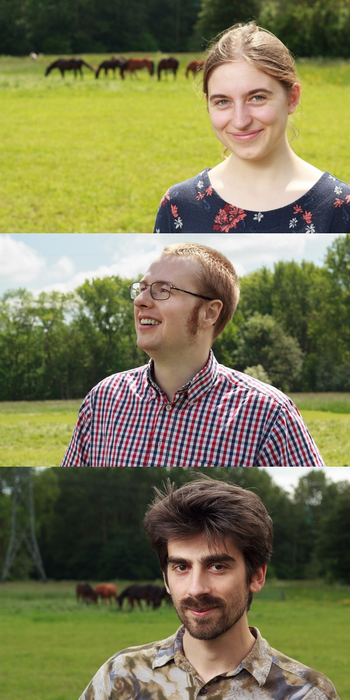All life evolves: microorganisms can become resistant to drugs, viruses evade our vaccines, and species may adapt to climate change. Even the ability to evolve can evolve. If we were to understand how this happens and which mechanisms play a role, it may be possible to predict evolution to some extent. This is why the concept of evolvability is now very popular in various areas of the life sciences. However, it turns out that this concept is used in very different ways within the scientific community. Theoretical biologists from the University of Groningen have now written a paper that should create some order in discussions on evolvability. It was published online in Trends in Ecology and Evolution on 10 February.

Credit: University of Groningen
All life evolves: microorganisms can become resistant to drugs, viruses evade our vaccines, and species may adapt to climate change. Even the ability to evolve can evolve. If we were to understand how this happens and which mechanisms play a role, it may be possible to predict evolution to some extent. This is why the concept of evolvability is now very popular in various areas of the life sciences. However, it turns out that this concept is used in very different ways within the scientific community. Theoretical biologists from the University of Groningen have now written a paper that should create some order in discussions on evolvability. It was published online in Trends in Ecology and Evolution on 10 February.
It all started with a journal club, organized by three PhD students in evolutionary biology. They could not always agree on whether a paper under discussion was really about evolvability and eventually realized that this could be due to their different backgrounds: the emergence of antibiotic resistance, the evolution of gene networks, and the evolution of vertebrates living in social systems. ‘The confusion that we experienced is also reflected in the literature,’ says Jana Riederer, joint first author of the paper together with journal club members Stefano Tiso and Timo van Eldijk. ‘We wanted to sort this out for ourselves at first,’ she continues. ‘But then we thought that it might be useful to others too.’
Timescale
The result of their discussions is a paper that describes different facets of evolvability. ‘We identified three types of mechanisms underlying evolvability,’ explains Van Eldijk. These are determinants providing variation, determinants shaping the effect of variation on fitness, and determinants shaping the selection process.
Furthermore, evolvability depends on the timescale. Pathogens, such as bacteria or viruses, often reproduce asexually by cloning themselves, while many hosts, such as humans, reproduce sexually. Therefore, questions regarding the arms race between hosts and pathogens are closely related to a longstanding debate in evolutionary biology: which type of reproduction facilitates evolution best? Riederer: ‘We concluded that they each work best at their own time scale.’
Sexual reproduction
Asexually reproducing organisms evolve fast, which is better in the short term but they typically do not reach the highest level of adaptation. In contrast, sexual reproduction slows down evolution but allows for a more thorough exploration of all options and, in the long-term, achieves a higher level of adaptation. Van Eldijk: ‘Evolutionary scientists often choose an endpoint for their studies and will, for example, look at which bacterial strain is best adapted after a hundred generations. But they might get a different outcome if their experiment were to continue for a thousand generations.’
A final aspect of evolvability is a difference in scope: some mechanisms work for many different environments, for example an increased mutation rate. Others, such as the presence of a specific enzyme that could evolve to confer resistance to a particular antibiotic, are limited in their scope. But both mechanisms can help to shape evolvability.
Influence
In conclusion, the three PhD students, who wrote the paper together with their supervisor Professor Franjo Weissing, identified many different facets of evolvability. Tiso: ‘We had a lot of discussions; it took us about two years. We had to consider many points that are outside our different disciplines.’ Their hope is that this paper will stimulate communication between evolutionary biologists and perhaps lead to practical applications. After all, once the mechanisms of evolvability are clearer, it may become possible to better predict the course of evolution. ‘In a probabilistic manner, of course,’ adds Van Eldijk. ‘But if we understand the mechanism by which an organism adapts, it will perhaps become possible to influence this process,’ Tiso agrees.
The framework that is described in the paper lays down clear recommendations for future research and can clarify discourse on evolvability. The authors conclude that this may help to resolve long standing discrepancies and debates in the field of evolutionary biology.
Reference: Riederer, J. M., Tiso, S., van Eldijk, T. J., & Weissing, F. J. (2022). Capturing the facets of evolvability in a mechanistic framework. Trends in Ecology & Evolution, 10 February 2022.
Journal
Trends in Ecology & Evolution
DOI
10.1016/j.tree.2022.01.004
Method of Research
Literature review
Subject of Research
Not applicable
Article Title
Capturing the facets of evolvability in a mechanistic framework
Article Publication Date
10-Feb-2022
COI Statement
None




